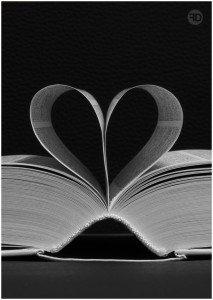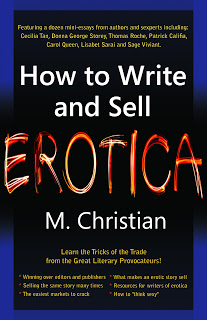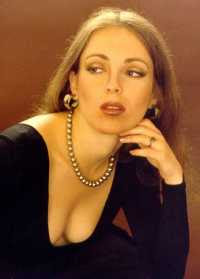There is an early problem
with choosing to write a story in first person present – nobody wants to hear
it.
Most erotica readers are women,
they just are, and hearing the word “I” over and over reminds a woman
too much of a really bad date. It can
raise the specter of a self absorbed person boasting and bragging to impress you. Unless of course that is the tone you want
which is a rare thing but not impossible.
“Slowly I raised my right hand and I placed the cigarette between
my pouting but not unmanly lips as I was thinking of Ashley’s outrageous
nipples and I shifted nervously from my left foot to my right foot and I arched
my chiseled, masculine brows as I felt the squeeze of my legendary spam spear
swell in my virile and aching loins. I groaned.”
So help me Jesus.
Nevertheless, writing in the
first person present is the most commonly chosen form for popular erotic short
fiction and there are good reasons for it.
The first person present potentially at least, conveys authority and
authenticity. It conveys immediate
character and personality and can, potentially at least, convey the most intimate
experience of that most intimate of human acts.
Like the ghost of Christmas Present it invites the reader to get to know
you better.
First person present, done
well has the quality of afterglow pillow talk.
Of late night confessions over a kitchen table. The pot of tea gone cold, the radio
whispering as your mother reaches her fingers across the toast and jelly to
touch your hand. “There’s something
you’re old enough now to know. Your
father, well he’s not your father. Not
your real father. Well. There.”
So your challenge will
always be how to win your reader over to what your character is offering. So much of writing is about seducing your
reader and a person knows when they’re being seduced. How will you seduce?
One of the early creative decisions
you’ll have to make is if the first person narrator is also the Deciding
Character or telling the story of the deciding character from memory, something
called “Apostolic Fiction”. (RE: Jesus
never told his autobiography, it was told by his followers about him after the
event.) Examples of apostolic fiction
could be “Shane” or “The Great Gatsby” in which Nick narrates the past story of
his friend Jay Gatsby. The Deciding
Character is Jay Gatsby, but the story is told by someone else. In apostolic fiction an unreliable narrator
can twist and bend the story to protect himself or to glorify his hero or to
lie outright. It can also be a way of
telling a story from another viewpoint, say a white settler telling the story
of an Indian he knew personally.
One of the greatest war
novels in modern literature is “The Boat” (“Das Boot”) authored by Lothar
Gunther-Buckheim, a German journalist who was assigned by Josef Goebbels to go
on two U Boat patrols to provide material for propaganda articles. After the fall of Nazi Germany Buckheim wrote
the novel Das Boot in first person present, which seems to be a common standard
in German fiction. Although the Deciding
Character is “The Old Man”, the U Boat’s Captain, the story is told by the
journalist assigned to the crew to write about the U Boat experience. Apostalic fiction. As a device it gives a sense of intimacy and
immediacy while at the same time allowing a view from all over the boat without
being limited only to where the Captain is at any moment. The narrator can move freely with a journalist’s
sharp eye for detail and still paint realistic scenes of great tension, such as
the sounds of a British merchant ship sinking followed by a depth charge attack
by a destroyer:
“Damned slow running
time. I’d already given up.” The
Commander’s voice is back to its usual dark growl. The breaking and cracking, roaring and
tearing show no sign of coming to an end.
“Now there’s a couple of
boats you can write off for good.”
Then a shattering blow
knocks me off my feet. In the nick of
time I catch hold of a pipe to break my fall.
There’s a crash of breaking glass.
I pull myself upright,
automatically stagger forward a couple of steps, jostle against someone,
collide with a hard corner and collapse into the hatch frame.
This is it! The reckoning! Mustn’t let yourself go!
The hatch frame almost
bucks me out. An enormous detonation
tries to shatter my eardrums. Then blow
after blow, as if the sea were a mass of huge powder kegs being set off in
quick succession.
The narrator’s authority comes
from the war experience Buckheim’s had of actually being in a U Boat
during a depth charge attack. That
authenticity is how he overcomes the problem of listening to that “I” over and
over and earning the attention of the reader with his knowledge of the
experience he’s writing about. The word “I”
is used only twice, only when it can’t be avoided or replaced. Everything else is about the scene and the
emotional experience around him.
In the opening paragraphs of
your story you can choose to establish your narrator’s authority with the
reader either by appealing to the insider’s knowledge your character has of the
experience he’s describing, or appeal to the heart by presenting a character
with a certain self deprecating honesty.
Again, think of it as a date. You
might warm up to a date who is capable of laughing at himself and seems to
speak openly and honestly regarding his hopes and faults. This is especially important if you are
presenting a narrator who is dislikeable.
The reader doesn’t have to like your narrator. But they should be curious about them. They should want to care about what is about
to happen to them.
Think carefully of that last
sentence. It’s the soul of short
fiction. The secret of horror fiction,
erotic or romantic fiction, any fiction that attempts to create a visceral experience is that we must care about the Deciding Character. We don’t have to like them. Truly.
But we have to care about them.
From my own poor stuff, I
can offer two stories told in first person present by dislikeable
narrators. Here is the voice of Nixie, a
vampire girl originally from Bavaria, who as the story opens is on her way to retrieve
her mortal lover who has abandoned and fled from her. She is tracking him by scent in this opening
paragraph from “The Lady and the Unicorn”
Blood has a
range of taste, as scent has a range of aromas. Blood has a high level
taste and an under taste. It is a blending of elements like music.
This is also the way of scent. The under aroma tells you there is a trail
and betrays to you the direction. If the scent becomes fresher you are
following the creature that produced it, so you must use the under scent to
know which direction is older and which is newer. It is as though the air
were filled with singing voices and you are picking out from the choir the
sound of a single voice. The high scent will tell you the individual, the
condition of the individual, if it is injured or sick, horny or filled with
fear. It will tell you how to catch him, where he is likely to run
to. To acquire the high scent the animal, or myself, must pause to
commune with the air and pay attention. Close the eyes. Hold the nose
still and just so. Let the night air speak. It is the same with the
deep taste of blood, except that scent is on the move, and if you are
tasting the blood—well. It is no longer on the move.
https://erotica-readers.com/GD/TC-EF/The_Lady_and_The_Unicorn.htm
This is attempting authority
with the reader through the character’s knowledge. Nixie sounds like she knows what she’s
talking about. She doesn’t brag. She hardly refers to herself at all. She never tries to convince you how dangerous
she is, but by the end of the paragraph she doesn’t have to.
Here is another very
dislikeable narrator, Mack Daddy, a professional sex gladiator in “The Peanut
Butter Shot” published in “Mammoth Book of Erotica VOL 11”:
They used to wrap tape
around your hands to keep you from busting your knuckles up against the bones
of somebody’s face. Me, it’s the opposite. I have to wear special gloves when
I’m not in the ring. These gloves, they go for about $12,300, something like
that, dermatologically custom made. The insurance pays for them, so like I give
a shit, but that’s what they go for. I’ve got real warm soft hands. Women tell
me they’re softer than a baby’s hands. My champion hands are insured by
management for about $567,000. My tongue’s insured too, definitely, so I can’t
drink anything hot or cold or eat spicy, which sucks but it’s the job. My tongue and hands are my weapons.
The old prize fighters
would bust your nose or your ribs. A
punch to the kidney that would make you piss blood for a couple days. We sex fighters, we bust your will to
live. We take away your will to be
free. People look naked to us. We see inside your mind. You just think you know what you want,
bitch. I know what you really want,
because that’s how I get you. That’s how
I take you down. I look at you bitch – I
know what you want way better than you do.
I know it even before you know it.
That’s because I see you. I see
you like God sees you.
His voice is the opposite of
Nixie. Aggressive, violent, expressing
himself in short punchy sentences like jabs to the face; bragging like a young
athlete full of himself.
As a general thing
establishing your character by knowledge is easier than by heart. But heart is better if you can manage
it.
The other thing that is
quickly brought out in their voices is their Governing Characteristic. Listening to Nixie or Mack Daddy you get a
sense of what drives them and of what makes them peculiar. Writing in first person, give your narrator a
distinctive voice, not by speech dialects (“Aw shuckin’ lil’ lady yawl sure do got some kinda helluva
bodacious tits on ya’, yessiree.”) but by attitude. If you want them to sound like they come from
somewhere, or as in Nixie’s case if they speak English as a foreign language,
don’t do it so much in goofy spelling but in syntax and sound, establishing
personality by the words you choose and how you arrange them. Listen to the well-spelled parlor room
formality and 19th century syntax in the narrator’s voice in Charles
Portis’ “True Grit”:
““People do not give it credence that a fourteen-year-old girl could
leave home and go off in the wintertime to avenge her father’s blood but it did
not seem so strange then, although I will say it did not happen every day. I
was just fourteen years of age when a coward going by the name Tom Chaney shot
my father down in Fort Smith, Arkansas, and robbed him of his life and his
horse and $150 in cash money plus two California gold pieces that he carried in
his trouser band.”
That’s an
amazing opening paragraph. You have the Deciding Character. You have the
inciting event. You have the time and
the place, the desire and the problem. There
is great personality in that voice. If
you read only that paragraph, you’d have a sense of a brave, righteous girl with
a problem to solve and the ferocious tenacity to do it and you’d be about
right. This is also a perfect example of
establishing authority by heart, listening to the quirky and engaging sound of
the woman’s voice as she recalls the events of her childhood invites you to
care about her story.
What about a
character who is insane? You can
introduce the character’s Governing Characteristic by an obsession he
repeatedly returns to, a kind of chorus that sounds several times. In Brett Easton Ellis’ novel “American
Psycho”, Patrick Bateman is a yuppie Wall Street investment broker during the
Reagan era, and incidentally a vicious homicidal maniac who is obsessed with his
social status at all times. He shows his
Governing Characteristic to us by the way he obsessively lists what every
person he meets is wearing or carrying and often even how much money it costs:
It’s cold
for April and Price walks briskly down the street towards Evelyn’s brownstone
whistling “If I Were a Rich Man” and swinging his Tumi leather attaché
case. A figure with slicked back hair
and horn rimmed Peeples glasses approaches
in the distance, wearing a beige double-breasted wool-gabardine Cerruti 1881
suit and carrying the same Tumi leather attaché case from D. F., Sanders that
Price has, and Timothy wonders aloud, “Is it Victor Powell? It can’t be.”
Bateman does
this over and over with each person he meets until it almost drives you crazy
and then you begin to understand – he’s crazy.
So that exhausts
my thoughts for what they’re worth on first person present. Until next time, do well.









